牛津上海版七年级上Unit4 Period1教案(英语教案)
Module 4 Unit 1 Visiting relatives Workbook 教案(牛津上海版七年级上册) (3)

Unit 1 Visiting relatives一、教学内容:Module 4 Relationships Unit 1 Visiting relatives Period 1(一)课标单词(二)重点短语(三)语法知识(四)描述出行情况二、知识总结与归纳(一)课标单词1. invite2. expensive3. brochure4. agent5. soon(二)重点短语1. have got2. live in3. invite sb. to do4. travel agent5. at the end of (August)6. travel to7. stay with 8. talk to(三)语法知识1. Adjectives to make comparisons形容词的比较级1) 一般句式的构成:A + is / are+ 形容词比较级+ than + B如果是代词I, you, he 等,则A 是主格,B 是宾格e.g.: She is taller than me.主格比较级宾格It’s more interesting than plane.主格比较级名词2) 形容词比较等级的构成英语形容词比较等级有三个:原级,比较级和最高级。
形容词比较等级形式变化有规则的和不规则的两种。
规则变化a. 单音节词末尾加-er(比较级),-est(最高级)e.g.:原级比较级最高级great greater the greatestsmall smaller the smallestclean cleaner the cleanestb. 单音节如以e结尾,只加-r(比较级),-st(最高级)e.g.:原级比较级最高级fine finer the finestnice nicer the nicestwide wider the widestc. 闭音节单音节词如末尾只有一个辅音字母,需先双写这个辅音字母,再加-er(比较级),-est(最高级)e.g.:原级比较级最高级big bigger the biggesthot hotter the hottestred redder the reddestd. 少数以-y,-er,ow,-ble结尾的双音节词,末尾加-er(比较级),-est(最高级)。
七年级英语Unit4教案(共8课时)牛津版 上学期

第一课时(The first period)一.课前准备:1、让同学们查询有关食物的词汇,越多越好。
2、让同学们带食物的图片或实物。
二.教学目标:1、To revise old vocabulary and learn new vocabulary about food.(复习旧单词并学习有关食物的新词汇。
)2、To talk about likes and dislikes with regard to food.(讨论喜欢的和不喜欢的食物。
)3、To use adjectives to describe different tastes.(用形容词描述不同的味道。
)教学要点:三.词汇rice, hamburgers, chicken, fish, apples, oranges, vegetables, cakes, coke, chocolate, tea, mooncake, lemon, vinegar, hotpot, sugar, sandwich, sweet, sour, salty, spicy四.句型:1、What food do you like?What food does he/she likes?2、How does it taste?It tastes sweet/sour/salty/spicy.五.语言功能:Talk about different food.六.学习策略1、To develop students to look at the same thing in many ways.(培养学生对同一事物要有不同看法。
)2、To develop students' ability to classify what they have learned.(培养学生对所学知识分类能力。
)七.智能培养:Make a chart and talk about it.八.教学设计:Food1、Talk about food for three meals and snacks.2、Talk about food for meals one likes and dislikes.3、Talk about food by the table.4、Describe different tastes about food.九.教学步骤:Task Ⅰ1、Talk about food for three meals and snacks. This is a fun activity to learn and revise vocabulary and spelling.2、Of all the food and snacks, get students to work in groups to make a table by asking:What do you like/dislike?Name Love Like DislikeS1:S2:S3:TaskⅡ1、Ask Ss to look at different kinds of food in Part A. Go through the words and make sure that they can pronounce them well and understand their meanings.2、Ask Ss to tick the boxes according to their own likes and dislikes.3、Ask some students to present their answers and say something about their likes and dislikes.4、Ask Ss to report their classmates' likes and dislikes according to the table in Part 1.5、If there is time, ask Ss to talk about their family as well.Task Ⅲ1、Try to bring some pictures of different kinds of food with strong tastes. Get Ss to know the meanings of "sweet, sour, spicy and salty".2、Ask Ss to think of other foods that are salty, sour, spicy or sweet.3、Look at P59 in the textbook and finish them.Task ⅣExercises.教学反思:第二课时(The second period)课前准备:1、预习阅读资料,查出生词或新语言点。
牛津上海版七年级英语上册教学设计:Unit4Jobspeopledo
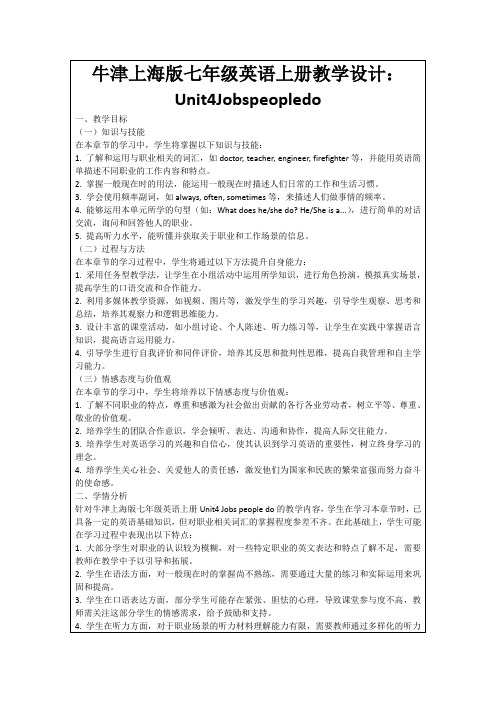
3.教师引导学生学习频率副词always, often, sometimes等,并在句子中进行实际运用,加深学生的理解。
4.教师讲解本单元的句型:“What does he/she do? He/She is a...”,并组织学生进行模拟对话,巩固所学知识。
1.大部分学生对职业的认识较为模糊,对一些特定职业的英文表达和特点了解不足,需要教师在教学中予以引导和拓展。
2.学生在语法方面,对一般现在时的掌握尚不熟练,需要通过大量的练习和实际运用来巩固和提高。
3.学生在口语表达方面,部分学生可能存在紧张、胆怯的心理,导致课堂参与度不高,教师需关注这部分学生的情感需求,给予鼓励和支持。
3.整合多媒体资源,如视频、图片等,丰富教学内容,激发学生的学习兴趣。同时,通过多媒体展示,让学生更直观地了解各种职业的工作场景。
4.设计分层作业,针对不同层次的学生,布置难易适度的作业,使每个学生都能在课后巩固所学知识,提高学习效果。
5.课后拓展活动:鼓励学生参加学校组织的职业体验活动,实地了解各种职业,将所学知识与社会实践相结合。
(三)学生小组讨论
1.教师将学生分成小组,每组选择一个职业进行讨论,探讨该职业的工作内容、工作环境、需要的技能等。
2.各小组用英语进行讨论,鼓励学生积极参与,提高口语表达能力。
3.讨论结束后,各小组向全班汇报讨论成果,教师进行点评和指导。
(四)课堂练习
1.教师设计一系列课堂练习,如填空、选择、连线等,让学生运用本节课所学知识,巩固职业词汇和一般现在时的用法。
6.教学评价:采用多元化的评价方式,包括课堂表现、作业完成情况、听力测试、口语表达等,全面评估学生的学习效果。
牛津上海版英语七年级上Unit4 Jobs people do教案

牛津上海版英语七年级上Unit4 Jobspeople do教案In Unit 1.Jobs People Do。
there are several ___。
The use of the third person singular in the present simple tense to describe what people do in their daily work ___ in this unit。
For instance。
"He is a doctor and he makes sick people better" and "Susan is a secretary and she uses her computer to type." These structures are fundamental grammar rules that students should master in their middle school years。
Therefore。
teachers ___.nally。
this unit introduces a wide range of job titles and the uniforms associated with them。
Flash ns can be designed to train students to match different ___。
special interrogative structures such as "Where do you work?" and "What do you usually do?" are used in the text to guide students in understanding the job ns.At the end of this unit。
上海版牛津英语七年级第一学期 7AModule1Unit4教案设计(5课时)

Module 2 My neighbourhoodUnit 4 Jobs people doTasks in this unit:Talking about people’s jobs: where people work and what they do; talking about work routines; doing a survey of people’s job and writing a report; reading about an accident and the people who help; compiling a page of common jobs and illustrating them. Language focus:Using nouns to identify peoplee.g., Mrs Wang is a doctor.Using the simple present tense to talk about habitual actionse.g., She works in a hospital.Language skills:Listening:Identify details that support a main ideaSpeaking:Open an interaction by eliciting a responseReading:Read written language in meaningful chunksWriting:Gather and share information and ideas by using strategies such as brainstormingEpisode oneTeaching procedureModule 2 My neighbourhoodUnit 4 Jobs people doLanguage focusUsing the simple present tense to describe habitual actionse.g., Who wears a uniform at work?Language skillsListeningIdentify details that support a main ideaSpeakingUse appropriate intonation and stress to convey intended meanings ReadingRe-read to establish and confirm meaningsEpisode TwoTeaching procedureModule 2 My neighbourhoodUnit 4 Jobs people doLanguage focusAsking Wh-questions to find out specific informatione.g., What’s your job?Asking Wh-questions to find out placee.g., Where do you work?Using the simple present tense to describe habitual actionse.g., I answer the phone.Language skills:ListeningIdentify main ideas in a new topicSpeakingOpen and maintain an interaction by asking and answering questions ReadingIdentify details that support a main ideaWritingGather and share information and ideas by using strategies such as interviewingEpisode ThreeTeaching procedureModule 2 My neighbourhoodUnit 4 Jobs people doLanguage focusUsing the simple past tense to talk about past actionse.g., …a motorcycle came towards Ben and knocked him downUsing adjectives to describe conditionse.g., Ben had a broken arm…Language skillsListeningListen for specific informationSpeakingUse appropriate intonation and stress to convey intended meanings and feelings ReadingRead written language in meaningful chunksEpisode FourTeaching procedureModule 2 My neighbourhoodUnit 4 Jobs people doLanguage focusUsing the simple present tense to describe habitual actionse.g., He sees the street cleaners cleaning the streets.Using adverbs of timee.g., They start work early.Language skillsListeningListen for specific informationSpeakingUse appropriate intonation and stress to convey intended meaningsReadingRead written language in meaningful chunksWritingPlan and organize information and ideas by deciding on the sequence of contentEpisode FiveTeaching procedure。
七年级英语上册 Unit 4 Jobs people do教学设计 牛津上海版

Unit 4 Jobs people do教学目标1、通过阅读,学生能掌握本课目标词汇:scene, knock down, ambulance worker。
2、通过运用寻读、细读、略读等不同的阅读技巧,学生能理清文本所叙述事件的过程。
3、通过合作学习,学生能更好地了解不同职业的职能特点。
4、通过小组活动,学生体验人物角色,揣摩人物内心,能够意识到不同职业的重要性和合作的重要性。
2学情分析1 . 本课中出现了较多的用(一般现在时)第三人称单数来表示、描述不同职业人们日常所从事的工作。
如“He is a doctor and he makes sick people better “ "Susan is a secretary and she uses her computer to type”等。
这些类似句式在六年级中已经出现,作为初中阶段必须熟练掌握的基础语法,教师有必要在课堂教学中加以一定的机械性训练。
2 . Where do you work ? What do you usually do ?等特殊疑问句式在课文中出现用来引导学生对职业内涵的进一步阐述。
3重点难点学习重点:1、了解不同职业的工作职责2、理清事件发展的逻辑顺序3、感悟各种职业的重要性以及体验分工合作的重要性学习难点:1、准确使用一般过去时描述过去发生的行为2、运用合适的阅读技能4教学过程【导入】Pre-reading activity1) Watch a video clip and have a friendly talk about it.2) Talk about the picture of the accident.通过欣赏一首Jobs song,激发学生兴趣并引出主题。
对事故图片进行简单讨论,教授课文目标词汇:knock down, scene。
【讲授】The accident1) Scan the first paragraph to fill in the table.2) Listen to a phone call and make a new one to report the accide nt.通过寻读,填表格,了解事件发生起因;并通过打报警电话,在真实的语境中对事故有更好的了解。
牛津上海版七年级英语上册优秀教学案例:Unit4Jobspeopledo

(三)学生小组讨论
1.教师组织学生进行小组讨论,让学生分享自己父母的职业,互相交流和介绍不同职业的特点和职责。
2.教师提出问题,引导学生进行小组讨论,如"What do you think are the advantages and disadvantages of your parents' jobs?"和"How has your parents' job influenced your life?",让学生深入思考和探讨。
(二)讲授新知
1.教师引导学生学习本单元的核心词汇,如"doctor," "teacher," "nurse," "farmer," "scientist,"等,并通过例句和练习帮助学生理解和运用这些词汇。
2.教师讲解本单元的句型和语法,如"What does your mother/father do?"和"She/He is a teacher/doctor/farmer,"并通过对话练习让学生熟练掌握和运用。
(五)作业小结
1.教师布置相关的作业,让学生运用本节课所学的知识和技能,进行实际的练习和应用。
2.教师提醒学生在作业中注意运用所学的词汇和句型,并要求学生在完成作业后进行自我检查和修改。
3.教师鼓励学生在课后进行进一步的学习和探索,如通过采访家人或朋友了解更多的职业信息,拓宽自己的知识视野。
五、案例亮点
(二)问题导向
1.设计一系列问题,引导学生思考和探讨不同职业的优缺点、工作环境、发展前景等,激发学生的思考和探究欲望。
沪教版英语七年级上册精品教案Unit 4Period 1
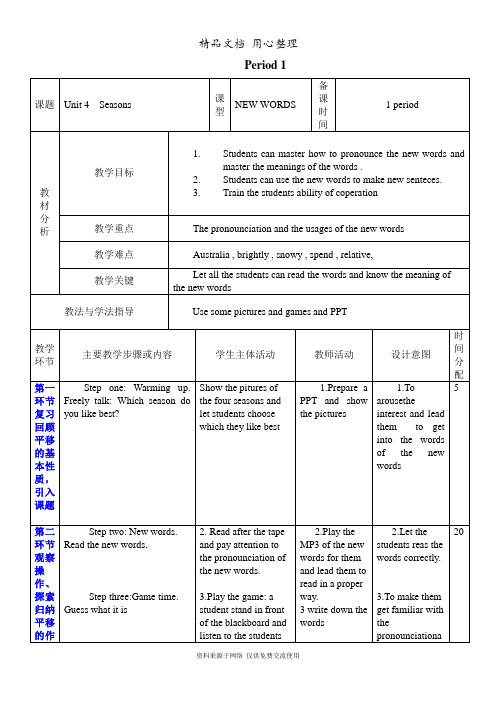
Write them down in your sheet
7. Remember the words you learn and spell them out
7.Give them a piece of paper to write the words.
第一环节 复习回顾平移的基本性质,引入课题
Step one: Warming up. Freely talk: Which season do you like best?
Show the pitures of the four seasons and let students choose which they like best
20
第三环节 课堂练习
Step six: exercise
1. use the correct forms of the words to fill in the blanks like :
He is a boy from _________(Australian)
2. choose the right pronucication of the words
Read the new words.
Step three:Game time.
Guess what it is
Step four: Key words learning.
Step five: have a competition
2. Read after the tape and pay attention to the pronounciation of the new words.
Australia, wet ,dry , blow, brightly , snowy , spend , relative, during.
牛津英语七年级上册《Unit4 Seasons 》单元教学设计reading第一课时

《Unit4 Seasons 》单元教学设计教学策略设计《Unit4 Seasons》第一课时教学设计教学目标设计教学策略设计学习评价设计1.Show four pictures of seasons, ask students to guess which season it is. And when is the four seasons? Ask students if he or she is a writer, what will he or she write about the season.2.This is _______________(spring/summer/autumn/winter). It is ____________(hot/warm/cold/cool). People can ____________(take a trip/ go on a picnic/make snowmen/ swim in the sea)【评价反馈】1.Diagnostic evaluation: Check students’ relevant knowledge store. Most of them know the date of the four seasons.2.Cultivate students’ imagination, and have a brain storm. They can think positively and show their answers as quickly as they can.【评价反馈】1.80% of them can use scanning skills to find the answer quickly, while the rest can’t.2.They have no idea about the part of speech.【主要内容】1.Ss will write a short article about their favorite season.2.Exercises on the worksheet for the important drills and phrases.【评价反馈】1.70% of them can use what they learnt to write a qualified passage about their favourite season. But a small number of them used the original sentence in the text. 30% of them can’t write a logical passage. They need further understanding to the passage.2.75% of the exercises are well-finished, but the preposition exercises are poorly-finished. Students need to pay more attention about the part of speech.教学过程设计教学评价与反思。
牛津上海版七年级上英语Unit4 Period1教案

Ability aims:Further the students’ability in expressingthefood they would like.
Teachingpoints:1. Identify details that support a main idea.
Summary
Identify the difference jobs and what they do.
To help Ss consolidate what they have learned in this period
Assignment
1.Learn the vocabularies by heart.
七年级英语上册教案
Unit4Jobs people do
Period One
Teaching Plan
Type:Read, match ad write
Designing ideas:Task-based andlearner-centered
Teaching aims:1. Use nouns toidentifypeople
To arouse Ss’ interestand lead in the topic.
While-task
Think and talk
What job do lly do?
Do you like your job?Why or why not?
Ask and answer questions
2.Do workbook.
Reporterfiremanpostman banker
(完整版)沪教牛津版初中英语七年级上册全套教学案

(完整版)沪教⽜津版初中英语七年级上册全套教学案7A UNIT 1 Making friendsⅠ重点单词:world n. 世界country n. 国家Japan n.⽇本Germany n. 德国German adj.德国的n.德国⼈grammar n.语法 blog n. 博客sound n. 声⾳everyone n.⼈⼈(谓语动词要⽤单数)hobby n.爱好(复数hobbies)age n. 年龄elder adj. 年长的dream n. 梦想complete v. 完成us pron.我们 yourself pron.你⾃⼰friendly adj. 友爱的engineer n. ⼯程师 flat n.公寓mountain n. ⼭Ⅱ重点短语:1.colse to 接近 = near 反义词:far (away)from 远离2.go to school 去上学3.be good at 擅长 =do well in 反义词:be bad /poor at=do badly in不擅长4.make friends with 与……交朋友 make friends 交朋友5.all over 遍及6.I’d like to=I would like to 愿意Ⅲ重点句型:1.what does···mean?2.welcome to3.I like···because···4.My dream is to be··.5.How old is/are ····?6.What does ····do?Ⅴ详细讲解:1.Read a G erman girl’s blog.(Page1)(1)German :① adj.德国的(德国⼈的,德语的)This is a German car.② n.德国⼈,是可数名词。
牛津上海版英语七年级上册《Unit 4 Jobs people do》教学设计4
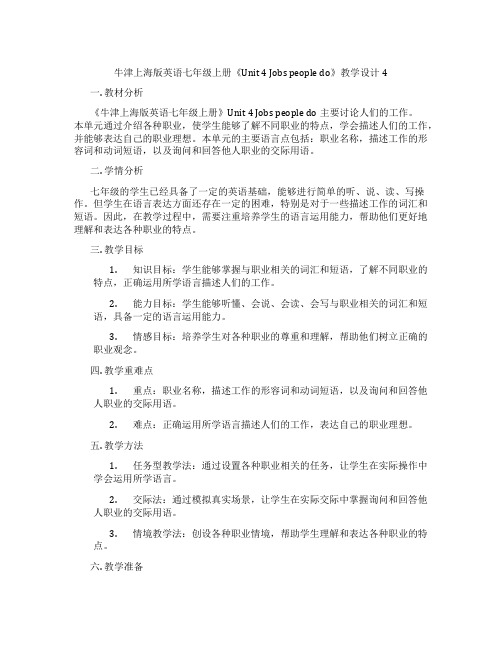
牛津上海版英语七年级上册《Unit 4 Jobs people do》教学设计4一. 教材分析《牛津上海版英语七年级上册》Unit 4 Jobs people do主要讨论人们的工作。
本单元通过介绍各种职业,使学生能够了解不同职业的特点,学会描述人们的工作,并能够表达自己的职业理想。
本单元的主要语言点包括:职业名称,描述工作的形容词和动词短语,以及询问和回答他人职业的交际用语。
二. 学情分析七年级的学生已经具备了一定的英语基础,能够进行简单的听、说、读、写操作。
但学生在语言表达方面还存在一定的困难,特别是对于一些描述工作的词汇和短语。
因此,在教学过程中,需要注重培养学生的语言运用能力,帮助他们更好地理解和表达各种职业的特点。
三. 教学目标1.知识目标:学生能够掌握与职业相关的词汇和短语,了解不同职业的特点,正确运用所学语言描述人们的工作。
2.能力目标:学生能够听懂、会说、会读、会写与职业相关的词汇和短语,具备一定的语言运用能力。
3.情感目标:培养学生对各种职业的尊重和理解,帮助他们树立正确的职业观念。
四. 教学重难点1.重点:职业名称,描述工作的形容词和动词短语,以及询问和回答他人职业的交际用语。
2.难点:正确运用所学语言描述人们的工作,表达自己的职业理想。
五. 教学方法1.任务型教学法:通过设置各种职业相关的任务,让学生在实际操作中学会运用所学语言。
2.交际法:通过模拟真实场景,让学生在实际交际中掌握询问和回答他人职业的交际用语。
3.情境教学法:创设各种职业情境,帮助学生理解和表达各种职业的特点。
六. 教学准备1.教师准备:备好相关职业的图片、视频等教学资源,设计好各种教学活动。
2.学生准备:预习本单元的生词和短语,了解一些基本的职业名称。
七. 教学过程1.导入(5分钟)利用图片或视频展示各种职业场景,引导学生谈论自己或他人的职业,激发学生对本单元的兴趣。
2.呈现(10分钟)教师展示本单元的生词和短语,让学生跟读,解释这些词汇和短语的含义,引导学生理解各种职业的特点。
牛津上海版英语七年级上Unit4 Jobs people do教案
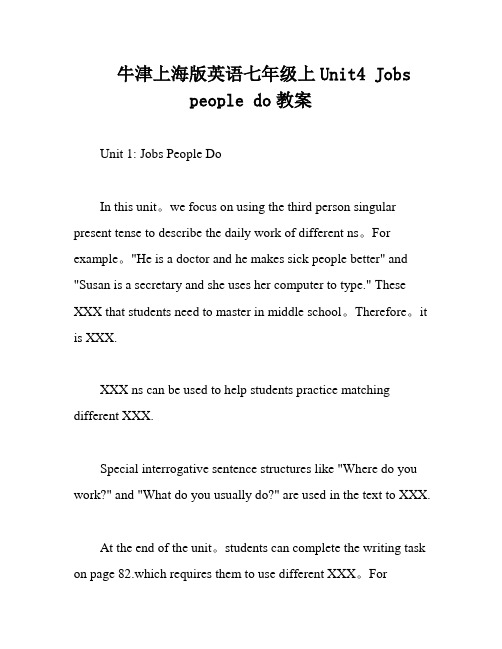
牛津上海版英语七年级上Unit4 Jobspeople do教案Unit 1: Jobs People DoIn this unit。
we focus on using the third person singular present tense to describe the daily work of different ns。
For example。
"He is a doctor and he makes sick people better" and "Susan is a secretary and she uses her computer to type." These XXX that students need to master in middle school。
Therefore。
it is XXX.XXX ns can be used to help students practice matching different XXX.Special interrogative sentence structures like "Where do you work?" and "What do you usually do?" are used in the text to XXX.At the end of the unit。
students can complete the writing task on page 82.which requires them to use different XXX。
Forexample。
"Henry is a mechanic and he works in a garage" and "David is a removal man and he works for a removal company."Students are also encouraged to use the present simple XXX should emphasize the use of the third person singular present tense。
牛津上海版英语七年级上Unit4 Jobs people do教案
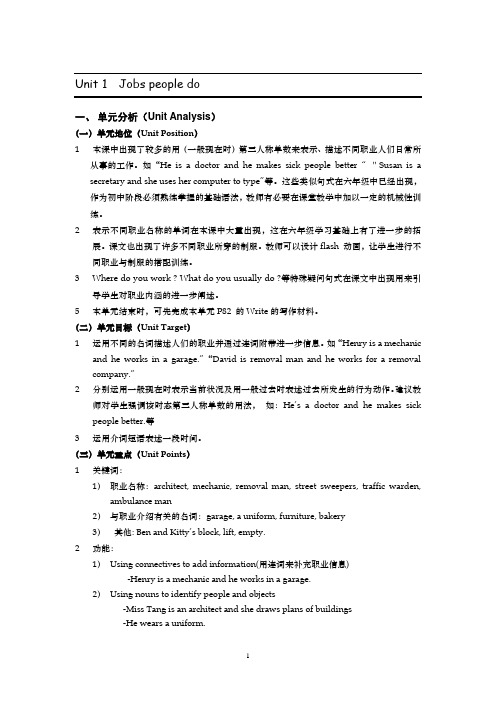
Unit 1 Jobs people do一、单元分析(Unit Analysis)(一)单元地位(Unit Position)1 本课中出现了较多的用(一般现在时)第三人称单数来表示、描述不同职业人们日常所从事的工作。
如“He is a doctor and he makes sick people better “"Susan is a secretary and she uses her computer to type”等。
这些类似句式在六年级中已经出现,作为初中阶段必须熟练掌握的基础语法,教师有必要在课堂教学中加以一定的机械性训练。
2 表示不同职业名称的单词在本课中大量出现,这在六年级学习基础上有了进一步的拓展。
课文也出现了许多不同职业所穿的制服。
教师可以设计flash 动画,让学生进行不同职业与制服的搭配训练。
3 Where do you work ? What do you usually do ?等特殊疑问句式在课文中出现用来引导学生对职业内涵的进一步阐述。
5 本单元结束时,可先完成本单元P82 的Write的写作材料。
(二)单元目标(Unit Target)1 运用不同的名词描述人们的职业并通过连词附带进一步信息。
如“Henry is a mechanicand he works in a garage.”“David is removal man and he works for a removal company.”2 分别运用一般现在时表示当前状况及用一般过去时表述过去所发生的行为动作。
建议教师对学生强调该时态第三人称单数的用法,如:He’s a doctor and he makes sick people better.等3 运用介词短语表述一段时间。
(三)单元重点(Unit Points)1 关键词:1)职业名称:architect, mechanic, removal man, street sweepers, traffic warden, ambulance man2)与职业介绍有关的名词:garage, a uniform, furniture, bakery3)其他: Ben and Kitty’s block, lift, empty.2 功能:1)Using connectives to add information(用连词来补充职业信息)-Henry is a mechanic and he works in a garage.2)Using nouns to identify people and objects-Miss Tang is an architect and she draws plans of buildings-He wears a uniform.3)Using adjectives to describe conditions-Ben had broken arm and the motorcyclist had a broken leg.4) Asking “Wh-“ questions to find out place, various kinds of information about a person-Where do you work?-What do you usually do?3 语法点:1)Using the simple present tense to talk about present states-David is removal man and he works for a removal company.2) Using the simple past tense to talk about past activities-I talked to Mr Chen and he told me about his job.二、教学设计(Teaching Designs)1教师可通过头脑风暴的形式帮助学生复习以往所学的职业名称,在黑板上写下job 一词,要求学生说出尽可能多的职业名称,教师挑选一些重要的写在黑板上。
上海牛津版七年级上册Unit4 The four seasons阅读课教学设计(蒋老师)
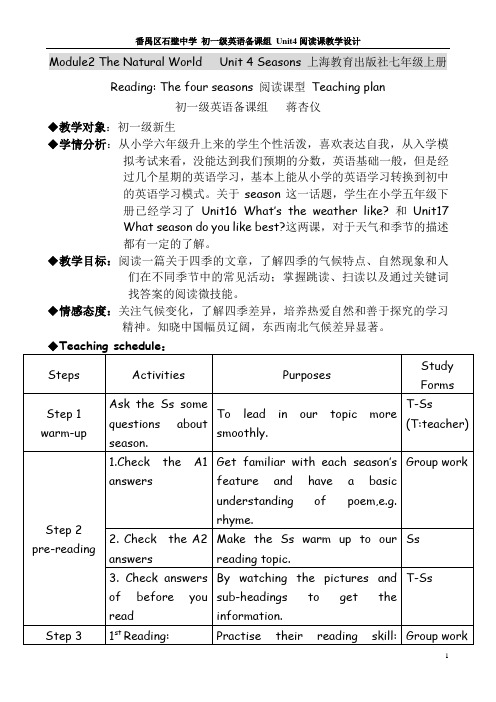
Module2 The Natural World Unit 4 Seasons 上海教育出版社七年级上册Reading: The four seasons 阅读课型Teaching plan
初一级英语备课组蒋杏仪
◆教学对象:初一级新生
◆学情分析:从小学六年级升上来的学生个性活泼,喜欢表达自我,从入学模
拟考试来看,没能达到我们预期的分数,英语基础一般,但是经
过几个星期的英语学习,基本上能从小学的英语学习转换到初中
的英语学习模式。
关于season这一话题,学生在小学五年级下
册已经学习了Unit16 What’s the weather like? 和Unit17
What season do you like best?这两课,对于天气和季节的描述
都有一定的了解。
◆教学目标:阅读一篇关于四季的文章,了解四季的气候特点、自然现象和人
们在不同季节中的常见活动;掌握跳读、扫读以及通过关键词
找答案的阅读微技能。
◆情感态度:关注气候变化,了解四季差异,培养热爱自然和善于探究的学习
精神。
知晓中国幅员辽阔,东西南北气候差异显著。
◆Teaching schedule:
◆Teaching reflection:______________________________________ ______________________________________________________。
- 1、下载文档前请自行甄别文档内容的完整性,平台不提供额外的编辑、内容补充、找答案等附加服务。
- 2、"仅部分预览"的文档,不可在线预览部分如存在完整性等问题,可反馈申请退款(可完整预览的文档不适用该条件!)。
- 3、如文档侵犯您的权益,请联系客服反馈,我们会尽快为您处理(人工客服工作时间:9:00-18:30)。
Ability aims:Further the students’ ability in expressing the food they would like.
Teaching points:1. Identify details that support a main idea.
To get students to participate in class
Look and learn
Learn the text
To get Ss familiar with the sentence patterns.
Listen and read.
Read after the recording.
To arouse Ss’ interestand lead in the topic.
While-task
Think and talk
What job do you do?
o you like your job? Why or why not?
Ask and answer questions
Students’ activities
Purposes
Pre-task
Look, think and say
ShowSssome pictures about jobs. Look at the pictures and try to think what jobs they do.
(secretary, reporter, baker, singer, pilot, postman, shop assistant, fireman)
Unit4Jobs people do
Period One
Teaching Plan
Type:Read, match ad write
Designing ideas:Task-based andlearner-centered
Teaching aims:1. Use nouns to identify people
Difficult points:Some sentence patterns
.
Learning strategies:Experiencing,cooperative and successful in learning
Teaching procedure:
Stages
Teacher’s activities
Reporter fireman postman banker
To get Ssfamiliar with thenew vocabularies.
Say and guess
Suppose you have got a job now. Tell your classmates what you are good at and what you usually do at work. Then invite a classmate to guess what job you do.
To help Ss think of the vocabularies.
Post- task
Fill in the form.
Fill in the form.
To guide Ss to usewhat they have learned in the text to express the food they would like.
Summary
Identify the difference jobs and what they do.
To help Ss consolidate what they have learned in this period
Assignment
1.Learn the vocabularies by heart.
2. Open an interaction by eliciting a response.
3. Read written language in meaningful chunks.
4. Gather and share information and ideas y using strategies such as brainstorming.
2.Do workbook.
